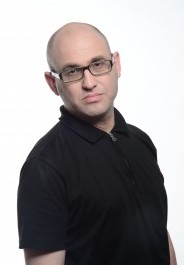
Keshet International, the distribution arm of Israel’s Keshet Media Group, has been in operation since 2000 but has in recent years generated significant worldwide interest, generally acknowledged to be fuelled by success of the award-winning Homeland (the U.S. format of the Israeli drama series Prisoners of War), which has since won six Primetime Emmys and five Golden Globes.
Q: What makes Keshet different?
Shtruzman: Everything we do in Keshet is real and original. We call it “edgy mainstream”. Homeland is absolutely edgy mainstream because in a way, it’s another American spy warfare show. It’s very controversial, with a lot of edgy points and controversial characters. It’s very critical about Americans but still, it is a very big show in America.
Anything we do is slightly off the mainstream and slightly different. Israel is very liberal and almost extremely free, and we’re surrounded by countries who do not necessarily love it this way. We create content which is educated and slightly edgy, but good and compelling enough to attract the audience. Keshet’s performance in ratings is famously outstanding. We never go below 20% in ratings for prime time. We have a very big slate of scripted and non-scripted shows. Those successful shows are the shows we create and distribute to other countries.
Q: Despite the many entertainment formats and scripted dramas that are coming out of the UK and the U.S., why do you think there is still interest for Keshet’s content?
Shtruzman: We don’t undermine content from the U.K and the U.S. It’s great content. Israel is getting interest because it’s new. What happened in the last few years is that the Israeli market realised that there’s a market beyond Israel. It’s also partly because of the fact that more and more production companies in China are buying formats.
When we sell the shows (finished programmes), we sell the formats. We have great shows, which we can condense to a format and sell it to other countries and reproduce in their own local language. Development of the formats market, in a way, opened up for the Israelis to sell their shows. If we want to grow, the only way to do it is to look beyond your own market. We do the same with our content.
Dear Neighbours
Q: What do you get a sense of what Asian buyers are looking for?
Shtruzman: In Asia, it’s diverse. You can’t really approach Asia as one entity. In general, I can see that there’s still some reluctance in Asia to do scripted formats because it is more complicated and expensive. When it comes to drama, Asia prefers to do their own content. It seems like reality shows and FOX entertainment shows are now in demand.
If I were to get into every format separately, different formats can fit different countries. For example, we’re selling a format called Dear Neighbours – a dating show that takes place in small villages while the community helps one of their neighbour’s daughter find love. It can work in many other countries like China, Thailand and even Indonesia and Malaysia, but specifically for Singapore, it might work less because there are no villages so-to-speak. Generally, if there is an observation I can give – when it comes to formats and the Asian markets, they’re more into factual than scripted.
Q: When it comes to adapting formats, broadcasters have different budgets. What kind of flexibility are you able to grant buyers of formats?
Shtruzman: Maximum. I’ll give you a simple example. The Israeli Homeland was budgeted at US$170,000 per episode. The American Homeland was budgeted at US$3.5 million per episode. There’s a big difference. The building of a format allows you to adjust it to the local market’s needs and budgets. In Israel, we do dramas for US$150,000-$200,000 per episode. In America, it’s in the millions. So, you can produce the same formats in different budgets and conditions.
Q: What are some of the objectives that you have set for yourself coming to Asia?
Shtruzman: We’ll only be in commercial discussions with Asian markets, as well as, Asian buyers who are not staying in Asia. At last year’s MIP, I met many Chinese broadcasters. We discussed with them and thought to close a few deals in China and Korea. We want to do more in Malaysia and “up our game” in Asia, as they say in America. What we want to do is to have better relations with the networks and local creative community. We know that the secret and key to success in the market is to engage with local creators. You can’t really get your show on the air properly unless you have good local producers.
Q: You’re looking for local producers to co-produce, then?
Shtruzman: In one hand, we want for the networks to know us better and take more formats from our slate, and in the other hand, we’re looking for local producers and creators to work with us on the show. It could be a co-production, or a production fully financed by Keshet. We’re completely open but we know that the local creators are the key for our success. That’s why I’m meeting with producers, creators and writers because I want to engage them.
When we came to America with Homeland, we knew that the key is to find the right show runner. It took us a year to find Howard Gordon, who created 24 before that. We worked with Howard Gordon on almost recreating Homeland for the American market. It was the DNA of the Israeli show, but with a profound understanding of America but American show runners. We’re looking to find show runners, creators and producers in Asia, and to work with them on localising our shows, as well as getting them on the air.








